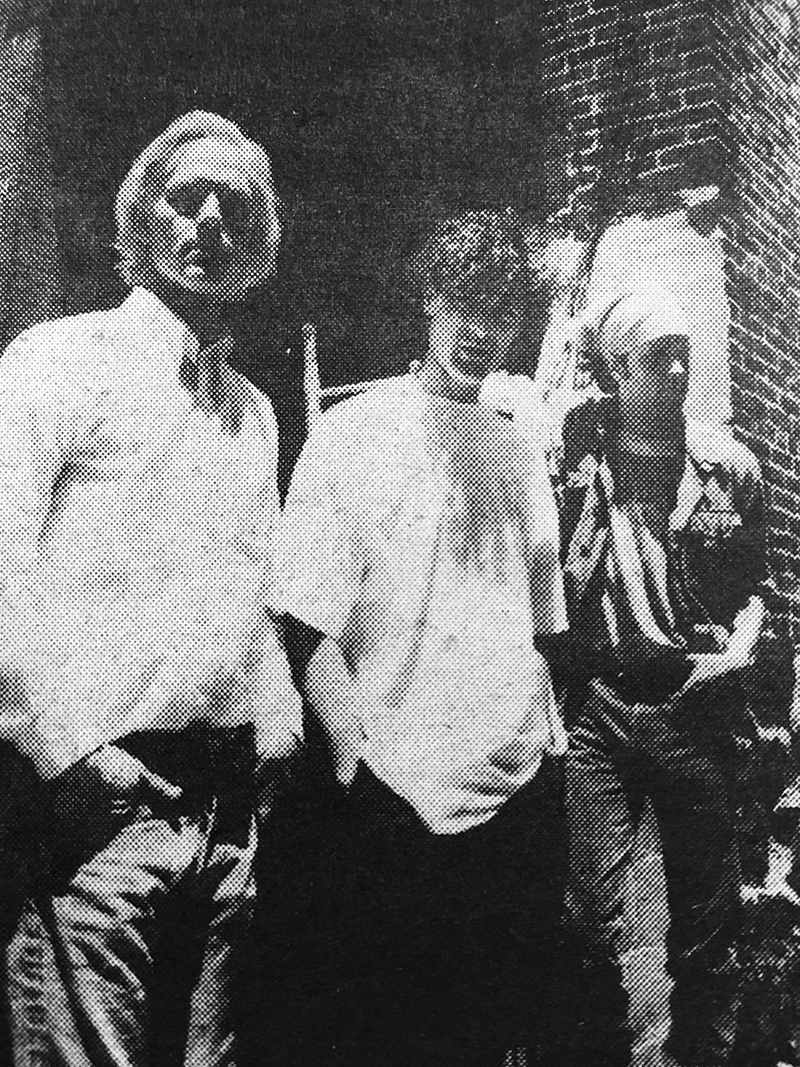Honour Society: On a Worldwide Wavelength

Society members (left to right) Dean Wilson, Bruce Panula, and David Farrell. (photo by Gregg Kirk)
By GREGG KIRK
(June 1989, Big Shout Magazine)
In the fall of 1984, a trio calling themselves Honour Society arranged a repertoire of 40 songs in the space of three rehearsals and debuted the material at the Barn Door in Wilmington. The unlikely mixture of psychedelia, soul and industrial guitar was presented to the audience, and according to bandleader Dean Wilson, “nobody got it.”
However, what was originally meant to be a fleeting psychedelic three-piece unit intended only as a means to develop a style, became an ever-evolving yet cohesive band that has enabled Wilson and his new bandmates to express the interaction of their personalities in a visual and audial way.
It would be an injustice to the band and their admirers to compile a laundry list of their accomplishments and downfalls within the confines of a conventional article. The band is far from being conventional. If anything, they are one of the most groundbreaking groups to spring from the often sterile loins of the Newark/Wilmington music scene. Therefore, what follows are the notes and thoughts I felt during the two days I spent interacting with and photographing the members of Honour Society…
WHAT THEY LIKE
One of the things the band doesn’t like to talk about is the past, but unfortunately that’s necessary. The line-up that begat the first Honour Society show in ’84 included Brian Hayes on bass and Richie Rubini on drums. Hayes now plays with the Nik Everett Group and Rubini is currently in his brother Rudi‘s band.
Before Hayes joined Everett, however, he left Honour Society in ’85 to play with the Bullets. Former Tommy Conwell & the Young Rumblers bassist Chaz Molins filled in for two years, and Hayes returned in ’87 to form one of the strangest incarnations of Honour Society. It consisted of two bass players (Hayes and Tony Capella), a sax player, a drummer, a percussionist, a pianist and two guitarists. They played rave-up versions of classic rock tunes and only lasted for eight gigs played exclusively at Kelly’s Logan House in Wilmington.
These shows revitalized Wilson and got him interested in filming an Honour Society video with the stripped-down three-piece version of the band. A friend of his, Jean Diver, a student at Moore College of Art in Philly offered to do this as her senior project. Current bassist and former WXDR DJ David Farrell was added, the band went into the studio to record the music for the video, and the resulting product was also planned to be released as a full-length album titled, What We Like.
However, in October of ’88, Rubini left the group to tour with Miles Goodwin, and the pressing of the album was delayed for six months. Wilson used this time to put together a band to promote these products, and Bruce Panula, former drummer of the Exam and Jahroots, was introduced into the line-up.
“Instead of just going over the old stuff, I wrote three new songs and we worked on them starting on July 7,” says Wilson. “We didn’t release the album until October 3 at J.C. Dobbs, and when we did, the first set was a huge napalm burst of energy. It was an amalgamation of a lot of improvisation and a surge of creativity. Now this is the way it should be.”
CULT OF PERSONALITY
“The whole idea of the band is that everything we do is a community project,” says Wilson. “The songs I write are a result of the interaction with the personalities in our band. And our direction is evolving on a daily basis. Each gig and even each rehearsal has a certain theme. We parallel this with our own personal development. This and our interactivity with each other is really the key to what we are all about now.”
WHAT THEY SOUND LIKE
Bbbbbbrrrrrriiiiinnnnnggg. Hullo? Schang. Kerang. “Jimmy,” “Chuck,” “Unnatural,” “King for Awhile,” “Angels,” “Good Reason to Live,” Delay loop enveloper. Thud. A-thud, thud, thud baat. Splashing, washing squealing, leaping, thump. Dit, dit-dit, dit, dit, dit “This is BBC 1” Feedback. White noise, pink noise. “You’re young and able… waiting outside of your door.” Spirit of the blues with a world dance beat. Melancholy.
A shortwave radio has become a vital part of their live performance. Wilson turns on the radio, puts it atop his amp and lets the radio waves of different countries insinuate themselves into the music. “It’s great,” smiles Wilson, obviously pleased. “We’re interacting with a worldwide wavelength.”
HONOUR ROLL
“Honour Society is about primordial essence,” says Panula. “I’ve never been in a band where there’s been this much breadth and understanding. We understand each other’s limitations and strong points, and there has been a lot of patience shown.”
“Playing in the band is a way of organizing a lot of random thoughts and ideas I had before,” says Farrell. “I think we are also about true sincerity.”
THE FUTURE
A seven-inch single, then a full-length LP to be accompanied with a film to be recorded live while also recording in the studio. “We’re looking to develop new material and get better at what we’re doing. The seven-inch will come out by the fall and the LP will come out by Christmas and the New Year. We’ll do all the recording ourselves and then shop for a producer. When we finish this, we’ll shop for an independent record deal.”
“I want to do something authentic that unveils the power and the drama of our band and its essence without any kind of posturing or advertising sensibility. The film will be a document of what happened that day, not necessarily something that we will reproduce impeccably each time we perform.”